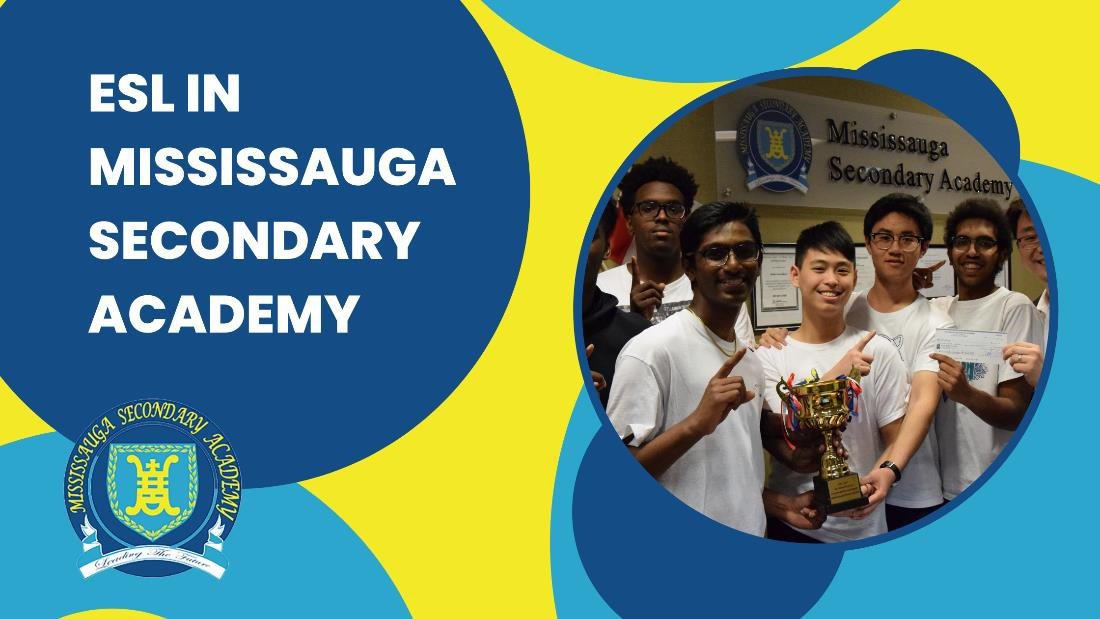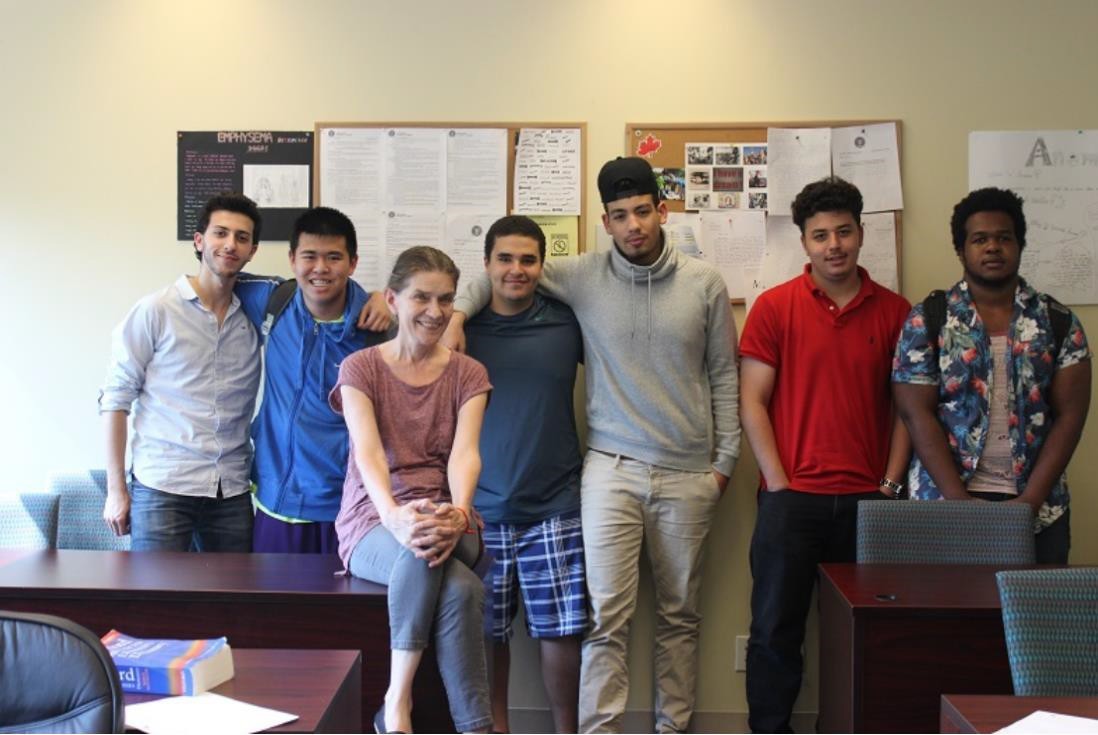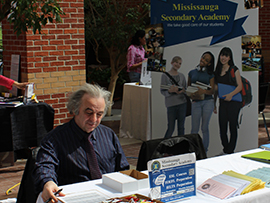
ESL AT MISSISSAUGA SECONDARY ACADEMY
The ESL (English as a Second Language) program at Mississauga Secondary Academy plays a vital role in helping newcomers to Canada adapt and succeed. Gaining proficiency in English is essential for many individuals who are settling in Canada, as it opens doors to better educational, social, and professional opportunities.
English is widely spoken and taught globally, and for those whose first language is not English, ESL programs are designed to bridge the gap. Our ESL courses cater to a variety of needs, whether students plan to move to an English-speaking country or simply wish to improve their language skills for education, employment, or international communication.
TWO KEY MODELS:
- For those planning to move to English-speaking countries: These programs focus on preparing students for life in an English-speaking environment, with a focus on language proficiency for social and academic success.
- For those seeking to understand English for education or work: These programs help students learn English to access content for educational purposes, entertainment, employment, or international business.
The growing differences between these two models have led to distinct teaching methods, specialized training, and professional development in the ESL field. At MSA, our experienced instructors ensure that each student receives tailored support to achieve their English language goals.

ESL METHODS AT MSA
Learning English as a second language (ESL) requires a personalized approach, as methods can vary depending on the student’s proficiency level and the context of their learning. ESL programs can range from required classes in schools to self-directed study at home, or even a blended combination of both.
In some programs, educational materials may be presented in a mix of English and the student’s native language to help with understanding. In other programs, all materials are provided in English, with vocabulary, grammar, and context clues adjusted to suit different levels of comprehension. Techniques such as comprehension adaptation, insight-oriented repetitions, and recasts are used to improve language skills effectively.
TYPES OF ESL TEACHING METHODS
At MSA, we employ a variety of ESL teaching methods to suit the diverse needs of our students. Some of the key methodologies include:
- Interactive Methodologies: Encouraging active participation through group work, discussions, and problem-solving activities.
- Step-by-Step Instruction: Breaking down complex concepts into manageable steps to ensure gradual and thorough learning.
- Activity-Based Learning: Using real-life tasks and scenarios to build language skills through practical experience.
It’s important to tailor the teaching approach to each student's needs in order to maximize learning outcomes.
CULTURAL CONTEXT AND LANGUAGE CHALLENGES
The success of an ESL program is not just about language instruction but also about cultural immersion. Without exposure to the culture of an English-speaking country, students may struggle to fully understand the language's nuances and local expressions. For instance, English in the United States and Canada has evolved differently, leading to regional variations in vocabulary, expressions, and usage.
At MSA, we recognize the importance of cultural understanding alongside language learning, and our programs incorporate elements of both to provide a well-rounded learning experience.
WHY CHOOSE MSA'S ESL PROGRAM?
Our ESL program offers a comprehensive and flexible approach to learning English, with a focus on individual needs and diverse learning styles. Here’s what you can expect from MSA:
- Professional and Enthusiastic Teachers: All instructors are Ontario Certified Teachers with extensive ESL teaching experience.
- Individualized Approach: We tailor our methods to each student’s level and learning style, ensuring maximum progress.
- Innovative Educational Materials: We use a dynamic range of resources to keep lessons engaging and effective.
- User-Friendly E-Learning Platform: Our online platform provides students with convenient access to materials and interactive lessons.
- Small Class Sizes: With smaller groups, teachers can provide personalized attention and real-time adjustments to improve learning outcomes.
- Flexible Schedule: Our program offers the flexibility to fit your schedule, whether you’re studying in-person or online.
GLOBAL ACCESSIBILITY
One of the standout features of MSA's ESL program is its global accessibility. Whether you are located in China, Japan, Korea, or anywhere in North America, you can attend classes through our online education platform. We also offer in-person classes that follow the same curriculum as our online sessions.
Our highly qualified faculty, consisting of Ontario Certified Teachers, uses a variety of techniques to enhance your English skills and ensure your success. With small class sizes, we focus on your individual needs, making adjustments as needed to help you progress quickly and confidently.

AFFORDABLE COURSE PRICING AT MSA
At Mississauga Secondary Academy, we offer competitive and affordable pricing for our courses compared to other schools.
- 5-Person Class: $450 for 20 hours
- 10-Person Class: $160 for 20 hours
- Application Fee: $30
The start date of the course will be communicated to you by the MSA Guidance Department. For any questions or additional information, please feel free to contact the Guidance Department at guidance@msaedu.ca.

MSA ESL PROGRAM OVERVIEW
Mississauga Secondary Academy (MSA) offers a comprehensive ESL program designed to help students develop their English language skills at every level of proficiency. Our program is divided into two main tracks: ESL Academic and ESL Business, both of which provide five progressive levels of instruction. Each level consists of five subcategories (S1, S2, S3, S4, and S5), ensuring a structured and personalized learning experience for every student.
Upon completing the five subcategories of a level, students will receive a progress report and may apply for credit. MSA will review the application and grant credits accordingly. However, students who only complete certain subcategories (e.g., S3-S5) will not be eligible for credit.
ESL ACADEMIC PROGRAM LEVELS
The ESL Academic Program is designed to support students in their transition to Canadian schools and to prepare them for higher education. Below are the levels offered:
| ESL LEVEL | PREREQUISITES | DESCRIPTION |
| ESL Level 1: Open (ESLAO) | NONE | This introductory course helps students adjust to the English language and Canadian environment. Students will practice basic English language skills in listening, speaking, reading, and writing for everyday and academic purposes. They will engage in simple conversations, read basic texts, and write short sentences. |
| ESL Level 2: Open (ESLBO) | ESL LEVEL 1 OR EQUIVALENT | This course expands students' English skills for both everyday and academic purposes. Students will engage in more complex conversations, read a variety of adapted texts, and write paragraphs. The course also introduces students to Canadian diversity and culture, supporting their adaptation to the Ontario school system. |
| ESL Level 3: Open (ESLCO) | ESL LEVEL 2 OR EQUIVALENT | Students will further develop their speaking, listening, reading, and writing skills, preparing them for more advanced academic tasks. The course includes oral presentations, reading original texts, and writing various text forms. It also introduces Canadian citizenship, rights, and responsibilities. |
| ESL Level 4: Open (ESLDO) | ESL LEVEL 3 OR EQUIVALENT | This level focuses on fluency and accuracy in academic and social contexts. Students will participate in discussions, read grade-level texts, and write essays and summaries. The course encourages critical thinking and engagement with Canadian social issues and media. |
| ESL Level 5: Open (ESLEO) | ESL LEVEL 4 OR EQUIVALENT | This course prepares students for post-secondary education by developing advanced English skills. Students will write essays, participate in debates, read literary works, and apply research skills. The course aims to foster independence in academic tasks and refine critical thinking abilities. |
ESL BUSINESS PROGRAM LEVEL
The ESL Business Program is tailored for students who need English proficiency for workplace communication and vocational purposes. This track also offers five levels, each building on the previous one:
| ESL LEVEL | DESCRIPTION |
| ESL LEVEL 1 | This introductory course focuses on basic English communication skills, including listening, speaking, and writing for everyday and workplace purposes. Students will begin reading simple texts and using basic English structures. |
| ESL LEVEL 2 | This level builds on students’ foundational skills and introduces more complex writing and reading tasks. Students will learn to communicate for both academic and business purposes and expand their vocabulary. |
| ESL LEVEL 3 | Students will improve their literacy and language skills, with a focus on speaking and writing tasks related to business and daily life. This level also introduces research projects and critical reading of diverse texts. |
| ESL LEVEL 4 | his course develops students' ability to communicate with accuracy and fluency in a business context. Students will engage in research, critical reading, and writing tasks, and use community resources for learning. |
| ESL LEVEL 5 | The final level prepares students for employment pathways, including apprenticeship and cooperative education programs. Students will focus on independent reading and writing tasks and improve their oral communication skills in various professional settings. |
KEY FEATURES OF MSA'S ESL PROGRAM
- Professional, Experienced Teachers: Our ESL instructors are highly qualified, Ontario Certified Teachers with extensive teaching experience.
- Individualized Approach: We personalize each student’s learning experience to ensure the best possible progress.
- Comprehensive Learning Materials: MSA provides a range of innovative educational resources to enhance your language learning.
- Small Class Sizes: With small class sizes, teachers can offer personalized attention and adapt lessons to meet the specific needs of each student.
- Flexible Learning Options: Choose between in-person or online classes, allowing students from all over the world to participate in our program.
GET STARTED TODAY
MSA's ESL program offers a dynamic and engaging learning environment that will support you in reaching your English language goals. Whether you're preparing for academic studies or improving your business English, our courses are designed to help you succeed.

MSA ESL PROGRAM: POLICIES & PROCEDURES
Payment and Assessment
After students complete their payment, they will undergo a language proficiency assessment. The assessment will include spoken language questions to evaluate their current skill level. Based on the assessment results, as well as the student's age and abilities, MSA will assign them to an appropriate class.
Class Placement and Adjustments
If students are not satisfied with their class placement, they may request to change classes. MSA will consider class availability and will do its best to accommodate the student’s needs. Audition opportunities for re-assignment will be provided when available.
Tutoring Classes (TC3)
Students have the option to choose TC3, MSA’s tutoring class, priced at $35 or $50. The $35 option is ideal for students who do not need credit courses in Ontario but want additional language support.
Absences and Online Classes
In the event that a student is unable to attend in-person classes due to illness or other reasons, the student must email both the teacher and the guidance office with an explanation of the absence. MSA will also offer live broadcast options for classes, allowing students to participate remotely and interact with the teacher just as they would in an in-person setting.
Trial Classes
Currently, MSA does not offer trial classes for the ESL program. However, students may submit a request to the MSA Guidance Office if they would like to participate in a trial class. Requests will be considered on a case-by-case basis, and a valid reason for the request must be provided.






